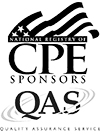Written Statement Analysis

Overview
Online
Description
Written statement analysis is the process of detecting deception by evaluating the contents of a documented statement. The underlying concept is that a deceptive person describes events from their imagination, rather than memory, and is therefore likely to manifest dishonesty in recognizable patterns of speech and word selection. Because of this, written statements can play a key part in evaluating deception during a fraud examination.
This course will help you understand how every word plays a part in a statement and how to identify signs of fabrication that could be staring back at you from the written page.
Key Takeaways:
- Red flags related to the fabrication of information
- How to uncover dishonesty using patterns of speech
- Using parts of speech to validate or invalidate a statement
- How to differentiate between honest and dishonest responses from subjects
Prerequisites
None
You Will Learn How To:
Identify strategies for using word choice and sentence structure to discern deception
Recognize the potential implications of changes in voice and tense
Recall the distinctions between responses from truthful and dishonest subjects
Ascertain the relevance of parts of speech in determining a statement’s veracity
Recognize the difference between balanced and unbalanced narratives
Table of Contents
| Lesson 1 | Introduction |
|---|---|
| Lesson 2 | Establishing a Baseline |
| Lesson 3 | Syntax |
| Lesson 4 | Narrative Balance |
| Lesson 5 | Temporal Lacunae |
| Lesson 6 | Nouns |
| Lesson 7 | Pronouns |
| Lesson 8 | Verbs and Tense |
| Lesson 9 | Adverbs and Adjectives |
| Lesson 10 | Voice |
| Lesson 11 | Prepositions |
| Lesson 12 | Conjunctions and Articles |
| Lesson 13 | Qualifiers and Non-Confirming Statements |
| Lesson 14 | Rationalizations, Excuses and Oaths |
| Lesson 15 | Questions and Explanations |
| Lesson 16 | Conclusion |
CPE Information
| CPE Credit: | 2 Credits |
|---|---|
| NASBA Information: | Communications and Marketing |
| Advance Preparation: | None |
| Last Updated: | April 2025 |
| Delivery Method: | QAS Self-Study |
Policies
CPE Credit
Please note: To be eligible for CPE credit, you must complete the final exam within one year of purchase date. You may only claim CPE credit for a course once.
ACFE Online Self-Study Courses
Features:
- 24/7 access to courses through your Internet browser
- Save time and quickly earn CPE credits with instant access, grading and printable certificate
- The flexibility to start or stop a course and pick-up right where you left off
- No additional shipping fees
Learn More about accessing your online self-study course
Learn More about online self-study courses and their features
System Requirements:
- Internet access: High-speed connection recommended
- Speakers required for video sound
 The Association of Certified Fraud Examiners, Inc. is registered with the National Association of State Boards of Accountancy (NASBA) as a sponsor of continuing professional education on the National Registry of CPE Sponsors. State boards of accountancy have final authority on the acceptance of individual courses for CPE credit. Complaints regarding registered sponsors may be submitted to the National Registry of CPE Sponsors through its website: www.nasbaregistry.org/.
The Association of Certified Fraud Examiners, Inc. is registered with the National Association of State Boards of Accountancy (NASBA) as a sponsor of continuing professional education on the National Registry of CPE Sponsors. State boards of accountancy have final authority on the acceptance of individual courses for CPE credit. Complaints regarding registered sponsors may be submitted to the National Registry of CPE Sponsors through its website: www.nasbaregistry.org/.
Ordering and Returns
Satisfaction Guarantee
If you are not 100% satisfied with any ACFE product, you may return it to us, provided it is in excellent condition, for a full refund of the item minus the cost of shipping. Toolkits and bundles may only be returned as a complete set.
Ordering & Returns Policy

